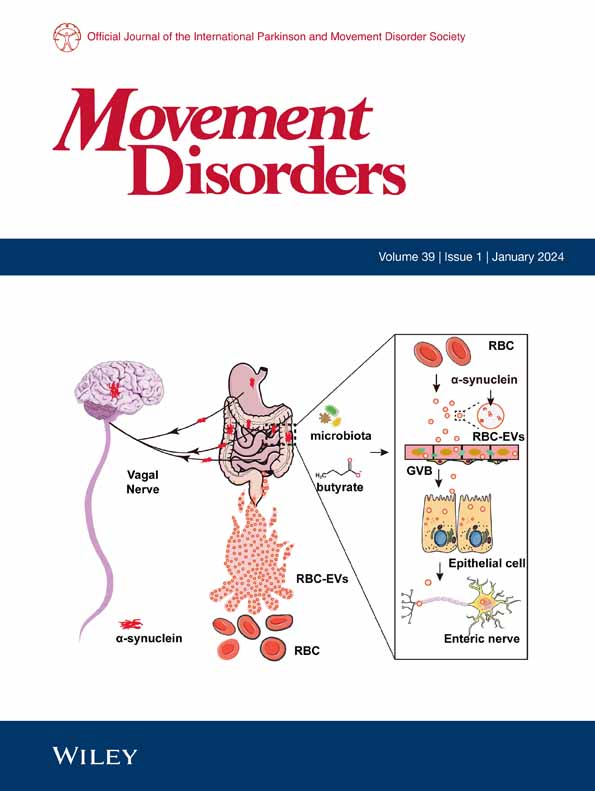Effect of GBA1 Mutations and APOE Polymorphisms on Survival and Progression Among Ashkenazi Jews with Dementia with Lewy Bodies
Tamara Shiner, Gitit Kavé, Anat Mirelman, Keren Regev, Yoav Piura, Orly Goldstein, Mali Gana Weisz, Anat Bar‐Shira, Tanya Gurevich, Avi Orr‐Urtreger, Roy N. Alcalay, Nir Giladi, Noa Bregman
求助PDF
{"title":"Effect of GBA1 Mutations and APOE Polymorphisms on Survival and Progression Among Ashkenazi Jews with Dementia with Lewy Bodies","authors":"Tamara Shiner, Gitit Kavé, Anat Mirelman, Keren Regev, Yoav Piura, Orly Goldstein, Mali Gana Weisz, Anat Bar‐Shira, Tanya Gurevich, Avi Orr‐Urtreger, Roy N. Alcalay, Nir Giladi, Noa Bregman","doi":"10.1002/mds.30003","DOIUrl":null,"url":null,"abstract":"BackgroundGlucocerebrosidase 1 <jats:italic>(GBA1)</jats:italic> mutations are associated with reduced survival in Parkinson's disease but their effect on survival in dementia with Lewy bodies (DLB) is unclear.ObjectiveTo assess the impact of <jats:italic>GBA1</jats:italic> mutations on survival among Ashkenazi Jews with DLB, while controlling for <jats:italic>APOE</jats:italic> status.MethodsOne hundred and forty participants from Tel Aviv Medical Center, Israel were genotyped for <jats:italic>GBA1</jats:italic> mutations and <jats:italic>APOE</jats:italic> polymorphisms. Survival rates and follow‐up cognitive screening scores were analyzed.Results<jats:italic>GBA1</jats:italic> mutation carriers had a two‐fold increased risk of death (HR = 1.999), while <jats:italic>APOE</jats:italic> status did not independently affect survival. In a subset of patients with available clinical data (N = 63), carriers of the <jats:italic>APOE ε4</jats:italic> allele showed faster cognitive deterioration, while <jats:italic>GBA1</jats:italic> mutation carriers also declined more rapidly albeit not significantly.ConclusionUnderstanding the genetic effects on survival and progression is crucial for patient counseling and inclusion in clinical trials. © 2024 The Author(s). <jats:italic>Movement Disorders</jats:italic> published by Wiley Periodicals LLC on behalf of International Parkinson and Movement Disorder Society.","PeriodicalId":213,"journal":{"name":"Movement Disorders","volume":"381 1","pages":""},"PeriodicalIF":7.4000,"publicationDate":"2024-08-30","publicationTypes":"Journal Article","fieldsOfStudy":null,"isOpenAccess":false,"openAccessPdf":"","citationCount":"0","resultStr":null,"platform":"Semanticscholar","paperid":null,"PeriodicalName":"Movement Disorders","FirstCategoryId":"3","ListUrlMain":"https://doi.org/10.1002/mds.30003","RegionNum":1,"RegionCategory":"医学","ArticlePicture":[],"TitleCN":null,"AbstractTextCN":null,"PMCID":null,"EPubDate":"","PubModel":"","JCR":"Q1","JCRName":"CLINICAL NEUROLOGY","Score":null,"Total":0}
引用次数: 0
引用
批量引用
GBA1 基因突变和 APOE 多态性对阿什肯纳兹犹太人路易体痴呆症患者的存活率和病情发展的影响
背景葡糖脑 1 (GBA1) 基因突变与帕金森病患者存活率降低有关,但其对路易体痴呆症 (DLB) 患者存活率的影响尚不清楚。结果GBA1基因突变携带者的死亡风险增加了两倍(HR = 1.999),而APOE状态并不独立影响生存。在有临床数据的患者子集中(N = 63),APOE ε4等位基因携带者的认知能力衰退更快,而GBA1突变携带者的认知能力衰退也更快,但不明显。© 2024 The Author(s).运动障碍》由 Wiley Periodicals LLC 代表国际帕金森和运动障碍协会出版。
本文章由计算机程序翻译,如有差异,请以英文原文为准。


